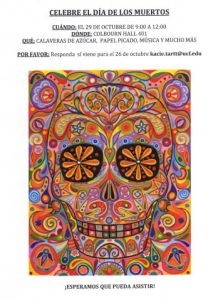
While some UCF students prepare for Halloween festivities, UCF Spanish professors conjured up their own version of a traditional Mexican celebration usually honored after the spooky holiday.
The Dìa de los Muertos festival returned to Colbourn Hall for its second year Wednesday, Oct. 29, and was sponsored by the UCF Modern Languages and Literatures department. Students were invited to decorate sugar skulls and get their faces painted during the event.
“We hope it will bring attention to the department not just to encourage more people to become Spanish majors, but also create a sense of community,” Spanish professor Kacie Tartt said.
Dìa de los Muertos, or Day of the Dead, is a two-day holiday that takes place every Nov. 1 and 2. The tradition originated in Mexico, though many Latin American countries recognize and honor the holiday.
Instead of associating death with sadness and mourning, Dìa de los Muertos commemorates the life of a loved one with food, drinks, and other activities that the deceased loved one did during their lifetime. During the holiday, the dead are considered a part of the community, awakened from their eternal sleep to share celebrations with their friends and family, Tartt said.
The Dìa de los Muertos festival at UCF began last year. This was the first year that it was open to all students.
“It initially started out as a classroom thing with just students taking the Spanish course,” Spanish professor Anne Prucha said. “This year, we tried getting more students involved.”
One of the traditions of Dìa de los Muertos is the lighting of a candle to remember a loved one who died. Students use this opportunity to send their deceased loved ones messages and ask them for guidance with any problems they were having.
Catherine Remaks, a freshman majoring in advertising and public relations, said she enjoyed learning more about the cultural experience.
“I think it’s cool to see the different aspects of the culture and peek into their traditions,” she said.
The event was held in one of the classrooms of Colbourn Hall, and although the celebration was not a large one, Tartt said that she would love to see the festival grow over the years and gain more attention from both students and faculty.
“If we can make it larger, we hope we’ll be able to reach out to the Spanish community, even if it’s just on a college campus,” she said.





